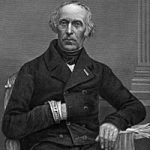
All in the family; Wilhelm II with, among other, George V and Alfonso XIII. All pictured here are cousins and descendents of Queen Victoria
The future King of Prussia and German Emperor was born in 1859, the eldest son of the then Crown Prince Frederick of Prussia (he later became Emperor Frederick III) and his wife, daughter and namesake of Queen Victoria of Great Britain and Empress of India. This made George V, against whom Wilhelm went to war his first cousin – an embarrassment to say the least. He was born with a semi-paralysed left arm, several inches shorter than the right one.
As boy and man the future king needed help at table with the cutting up of his food, as he was unable to hold foodstuffs with his left hand. Naturally he needed a nurse, at first, and later a valet to assist him to dress. Biographies tell us that Wilhelm was lazy, uncooperative and disliked the routine work he was expected to do. Getting him to read long reports was impossible. By eighteen years of age his knowledge of world affairs in general, and Germanic history in particular, was superficial but not unexistent.
As a young man he made sure his life was gay in the old-fashioned sense of the word: an endless round of banquets, balls, junketing round Europe, cruising in yachts, hunting wild animals, and parades. The emphasis was on parades. He was in love with uniforms, and was obsessed with the armed forces. His personal friends and advisers were always soldiers, and he preferred military uniform to any other kind of dress, even if he had done no basic training and could not hold a rifle properly because of the disability.
Von Bismarck, who was to use Wilhelm virtually as a puppet for his own ends, used to describe the future Kaiser as ‘a balloon which must be held on a string, or else it might go off anywhere’; if asked about Socialism, he would shout that socialists should be gunned down ‘wherever one saw them, in a bloodbath if necessary’. Such remarks upset the not very steely nerve of his ministers.
A bigwig in the German Foreign Office wrote in 1896: ‘the behaviour of the Emperor can only be explained pathologically.’ Grandmother Queen Victoria had had plenty of chances to examine her grandson closely, as he loved coming to London, Windsor and Balmoral: ‘he is such a hot-headed, wrong-headed and conceited young man’ she sternly said.
But when Wilhelm became Emperor (1888) he was given considerable powers under the Constitution. He could personally appoint all his ministers and make them responsible to him personally, and not to the Reichstag; he was, though it seems impossible to believe, responsible for foreign policy, which meant that he was guided by von Bismarck; he was Commander of all German armed forces. As he wished to be an absolute ruler he quickly discharged Bismarck (pictured here), breaking the old diplomat’s heart. He warned Germans that they must ‘follow him wherever he goes’. Luckily, as Wilhelm was subject to nervous disorders and breakdowns, his ministers usually went their own way. In some ways he was subservient to them, even when he was unwilling, as in the incident of the Reinsurance Treaty with Russia, not to renew it. The Tsar of Russia by the way, was another first cousin.
Whether or not Wilhelm II directly or indirectly caused the Great War in 1914, his belligerence and intolerance and lack of patience had a lot to do with what happened. Nevertheless, when the First War began and all the old way of life in Europe vanished in smoke and multitudinous death, he was ignored by his war ministers and generals alike. In 1918, with Germany smashed, and forced by the Allied Powers to pay for it at the Treaty of Versailles, he was forced to abdicate. He ran to Holland of all places, where he died an embittered and forgotten wreck, in 1941, after the invasion of that country by Adolf Hitler. It was the same year that another rejected monarch died, Alfonso XIII of Spain.









Leave A Comment